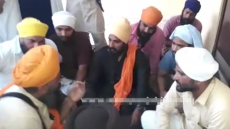The haunting image of a poor man pulling a pedal-rickshaw with his newborn daughter in a sling bag hanging from his neck in Rajasthan’s Bharatpur riveted the nation in 2012.
Bablu Koli lost his wife during childbirth and had no one to take care of little Damini.
The four-year-old child became an orphan this week as Koli, an alleged alcoholic, died in his rented home.
Neighbours discovered his death two days after he died and Apna Ghar Society, a charity, cremated him after autopsy.
Damini wasn’t by his side as she lives at a children’s shelter, where she was put four months after an outpouring of grief and support over the picture of Koli carrying two passengers on his rickshaw — holding the handle with one hand and clutching the baby sling with the other.
A wealthy well-wisher donated Rs 23 lakh for the child and the money was deposited in the State Bank of Bikaner’s Jaipur branch. The fund swelled to Rs 35 lakh over the years.
“We gave him money every month to care for the baby, but he spent it on alcohol,” said BM Bharadwaj, a member of the five-member committee that oversees Damini’s finances.
As Koli failed to mend his ways and couldn’t take proper care of the baby, the district child welfare committee sent her to the government-run home.
“We have sufficient fund and trying to send her to a boarding school,” Bharadwaj said.
Bharatpur district collector Narendra Kumar Gupta suggested as much, saying they will do their best of the “baby’s good future” as the state government has several schemes for orphans.
The Koli story underscores two of India’s biggest drawbacks. Despite being one of the world’s fastest-growing economies, about 30% of India’s 1.2 billion are abysmally poor.
Besides, alcoholism is rampant among the poor who often try to douse the fatigue of a hard day’s backbreaking menial work and low pay in bottles of cheap bootlegged and homemade liquor. The moonshine kills many every year. Koli was along them.
He was an incorrigible alcoholic, said Saroj Lohiya, chairman of the child welfare committee.





